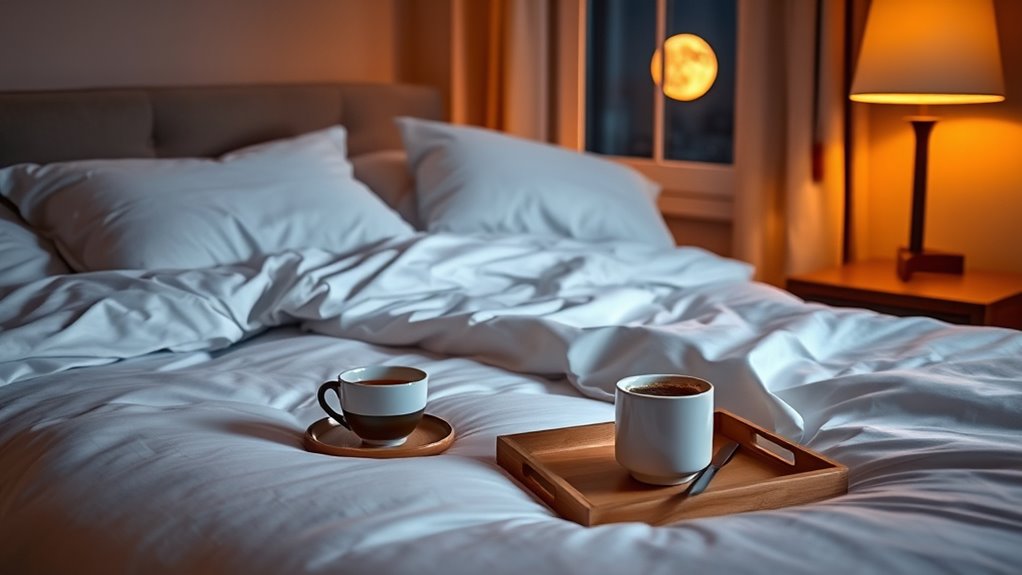To improve your sleep, stick to a consistent schedule by going to bed and waking up at the same times daily. Establish a relaxing bedtime routine with calming activities, and optimize your sleep environment—keep your room cool, dark, and quiet. Limit screen time before bed, avoid caffeine and heavy meals late in the day, manage stress with relaxation techniques, and get natural light during the day. Want to discover more about these proven habits? Keep going to find practical tips you can start tonight.
Key Takeaways
- Maintain a consistent sleep schedule, going to bed and waking up at the same times daily.
- Create a relaxing bedtime routine with calming activities and a comfortable sleep environment.
- Optimize your bedroom by keeping it cool, dark, quiet, and free of light pollution and noise.
- Limit screen time before bed and avoid caffeine or large meals close to bedtime.
- Manage external factors like light and noise to enhance sleep quality and support circadian rhythms.
Maintain a Consistent Sleep Schedule
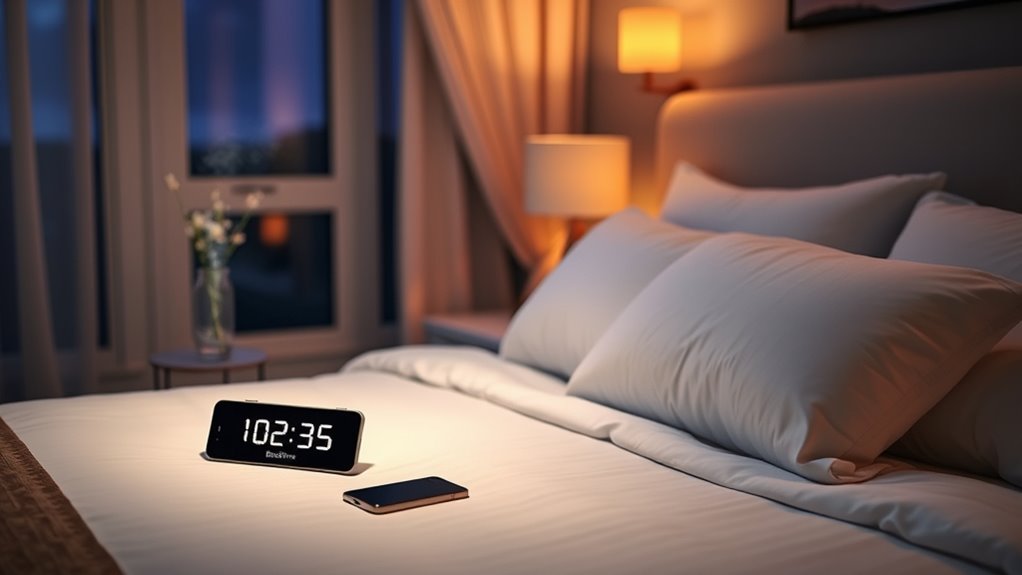
Maintaining a consistent sleep schedule helps regulate your body’s internal clock, making it easier to fall asleep and wake up feeling refreshed. Sleep consistency means going to bed and waking up at the same times every day, even on weekends. This regularity strengthens your circadian rhythm, improving sleep quality over time. Establishing a steady bedtime routine reinforces this consistency, signaling to your body that it’s time to wind down. Avoid drastic shifts in your sleep schedule, as they can disrupt your sleep cycle and cause fatigue. Incorporating habits such as self-watering plant pots with consistent routines can serve as a helpful analogy for maintaining regularity in your sleep habits. By sticking to a routine, you’ll find it easier to fall asleep naturally and wake up energized. Regularly reapplying sleep aids can support your efforts to maintain this routine, especially during stressful periods or travel. Over time, maintaining this consistency enhances overall sleep hygiene, leading to better rest and improved daytime functioning.
Create a Relaxing Bedtime Routine

To create a relaxing bedtime routine, try going to bed at the same time each night to train your body. Include calming activities like reading or gentle stretching to signal to your brain that it’s time to wind down. Consistency and relaxing habits help improve your sleep quality and make falling asleep easier. Incorporating evidence-based habits can further enhance your sleep hygiene and overall restfulness. Staying informed about sleep research can provide additional insights into optimizing your bedtime routine. Additionally, understanding sleep environment factors such as room temperature and lighting can support better sleep quality.
Establish Consistent Timing
Establishing a consistent bedtime helps signal your body that it’s time to wind down, making it easier to fall asleep each night. Sleep consistency strengthens your circadian rhythm, helping your body know when to prepare for rest and wakefulness. To maintain this rhythm, set a regular bedtime and stick to it, even on weekends. This consistency can also be supported by creating a calming environment, such as incorporating cozy textiles and maintaining good lighting conditions. You can also:
- Avoid large meals or caffeine close to bedtime
- Limit screen time in the hour before bed
- Keep a cool, dark, and quiet sleep environment
- Aim for at least 7-8 hours of sleep each night
Incorporating artistic elements into your bedroom decor can promote relaxation and prepare your mind for sleep. Creating a sleep routine that promotes sleep hygiene not only helps you fall asleep faster but also improves overall sleep quality, which is essential for health and well-being. Using wall organization systems with aesthetic appeal can help keep your bedroom tidy and visually soothing, further supporting restful sleep. Sticking to a routine promotes better sleep quality and helps your body anticipate rest, making it easier to fall asleep naturally.
Incorporate Relaxing Activities
Creating a relaxing bedtime routine can reinforce your body’s signals that it’s time to wind down and prepare for sleep. Start by engaging in calming activities like mindful breathing, which helps reduce stress and quiet your mind. Focus on slow, deep breaths to signal that it’s time to relax. Incorporate calming music at a gentle volume to create a soothing environment. These activities help your body shift from daytime alertness to nighttime restfulness. Avoid screens and stimulating tasks, opting instead for quiet, peaceful activities. Consistently practicing a routine that includes mindful breathing and calming music signals to your brain that sleep is imminent, making it easier to fall asleep quickly and enjoy more restorative rest. Using soundscapes can further enhance your relaxation and improve sleep quality. Additionally, incorporating relaxation techniques such as progressive muscle relaxation can deepen your sense of calm and readiness for sleep. Maintaining a consistent sleep schedule and creating a comfortable sleep environment further support your relaxation and overall sleep quality.
Optimize Your Sleep Environment
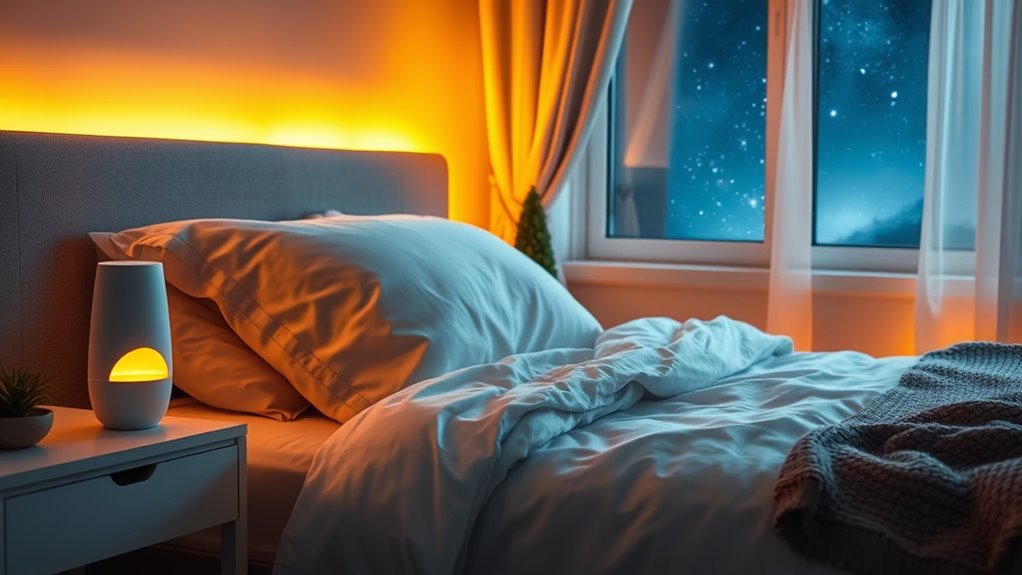
You can improve your sleep by creating a comfortable environment. Keep your room cool and dark, and eliminate noise that might disturb you. Small adjustments like these can make a big difference in the quality of your rest. Incorporating optimal sleep conditions, such as proper temperature and lighting, can further enhance your sleep quality. Additionally, using smart home technology to control your environment can help maintain these ideal conditions consistently.
Ideal Room Temperature
Maintaining the right room temperature is essential for a restful night’s sleep, as it helps regulate your body’s internal temperature and promotes relaxation. When the environment is too hot or cold, thermoregulation challenges can disrupt sleep cycles. To optimize your sleep environment, consider these tips:
- Keep your bedroom between 60-67°F (15-19°C) for ideal comfort
- Use temperature regulation devices like fans or heaters to adjust the climate
- Avoid sudden temperature fluctuations during the night
- Invest in breathable bedding to help maintain consistent body temperature
- Be mindful of water parks in Owatonna, MN, as improperly managed environments can sometimes impact overall comfort and health.
- Regularly checking and maintaining filtration and pump protection systems can help ensure a stable and comfortable sleeping environment.
- Considering dog breeds with temperature-sensitive coats can also enhance your sleep comfort, especially if your pet shares your sleeping space.
Minimize Light Pollution
Since light exposure can critically disrupt your circadian rhythm, minimizing light pollution in your bedroom is important for better sleep. You can do this by advocating for dark sky enforcement and supporting outdoor lighting regulations that reduce unnecessary light spill. Use blackout curtains or shades to block outside light, and switch to dim, warm-colored bulbs in your room. Turn off or cover any electronics with bright displays, which emit blue light that hampers melatonin production. Limiting outdoor lighting near your home, especially late at night, by encouraging local ordinances that promote responsible lighting practices. These steps help create a dark, sleep-friendly environment, aligning your internal clock for more restorative rest. Additionally, reducing light pollution can support somatic therapy techniques by decreasing environmental stressors that interfere with relaxation and emotional healing. Protecting your sleep environment from excessive light sets a foundation for consistent, high-quality sleep. Implementing light pollution mitigation strategies can further enhance your sleep environment by reducing environmental stressors. Incorporating tools like blue light filters on electronic devices can also prevent disruption of your melatonin production, contributing to better sleep quality. Regularly monitoring your sleep environment and air quality can help you identify and eliminate additional factors that may interfere with restful sleep.
Reduce Noise Distractions
Reducing noise distractions is essential for creating a sleep environment that promotes restfulness. To minimize disturbances, consider implementing soundproofing techniques such as sealing gaps around windows and doors or adding heavy curtains. Using a white noise machine can mask disruptive sounds, creating a consistent and calming background noise. You might also:
- Place rugs or carpets to absorb sound
- Use earplugs if noise persists
- Rearrange furniture to block noise pathways
- Install acoustic panels for enhanced soundproofing
- Choosing materials like foam or fabric can help enhance sound absorption. Additionally, selecting materials designed for soundproofing can further improve the effectiveness of your noise reduction efforts.
These strategies help create a quieter space, making it easier to fall asleep and stay asleep. Prioritizing a noise-free environment enhances your overall sleep quality and supports restorative rest.
Limit Exposure to Screens Before Bed
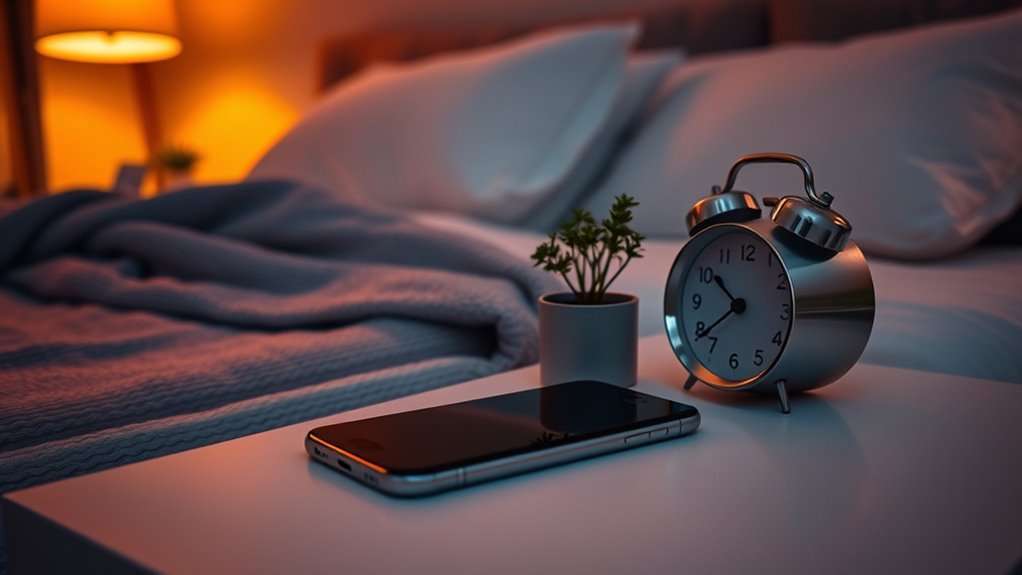
Exposure to screens before bed can markedly interfere with your sleep quality. The blue light emitted from phones, tablets, and computers suppresses melatonin, the hormone that helps you fall asleep. High screen time late at night can delay your sleep onset and reduce sleep duration. To improve your rest, try setting a screen curfew at least an hour before bedtime. Use features like night mode or blue light filters if you need to use devices in the evening. Instead of scrolling or watching, opt for relaxing activities like reading a physical book or listening to calming music. Limiting screen exposure helps your body naturally prepare for sleep, making it easier to fall asleep faster and enjoy more restorative rest.
Be Mindful of Your Caffeine and Alcohol Intake
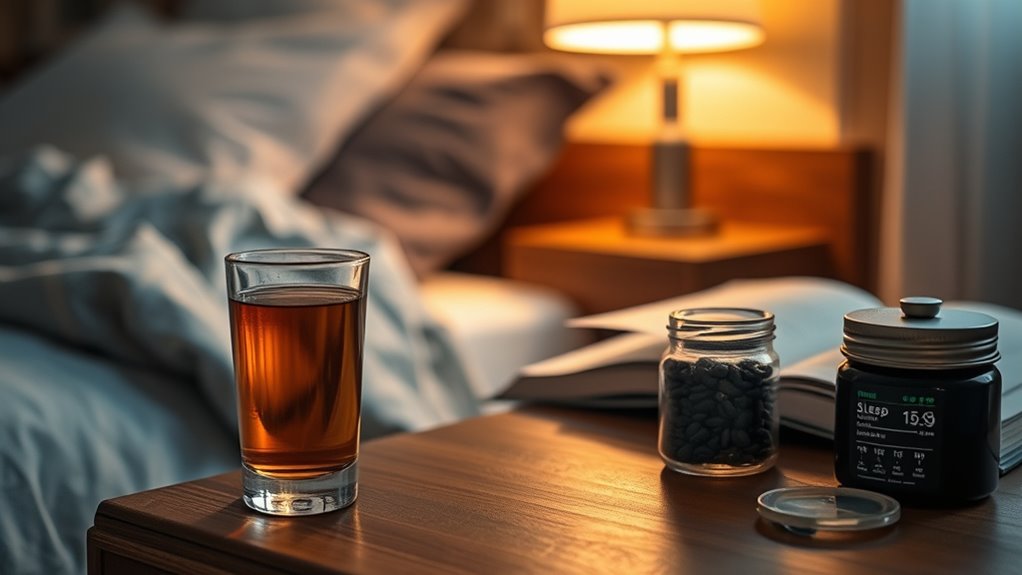
Being mindful of your caffeine and alcohol intake is essential for better sleep. Caffeine consumption, especially later in the day, can disrupt your ability to fall asleep and reduce sleep quality. Similarly, alcohol intake might initially make you feel sleepy, but it often leads to fragmented sleep and early awakening. To improve your rest, consider these tips:
- Limit caffeine consumption after early afternoon.
- Avoid drinks with caffeine, like coffee and energy drinks, close to bedtime.
- Keep alcohol intake moderate and avoid drinking right before bed.
- Recognize that alcohol can interfere with REM sleep, affecting overall restfulness.
Get Regular Physical Activity
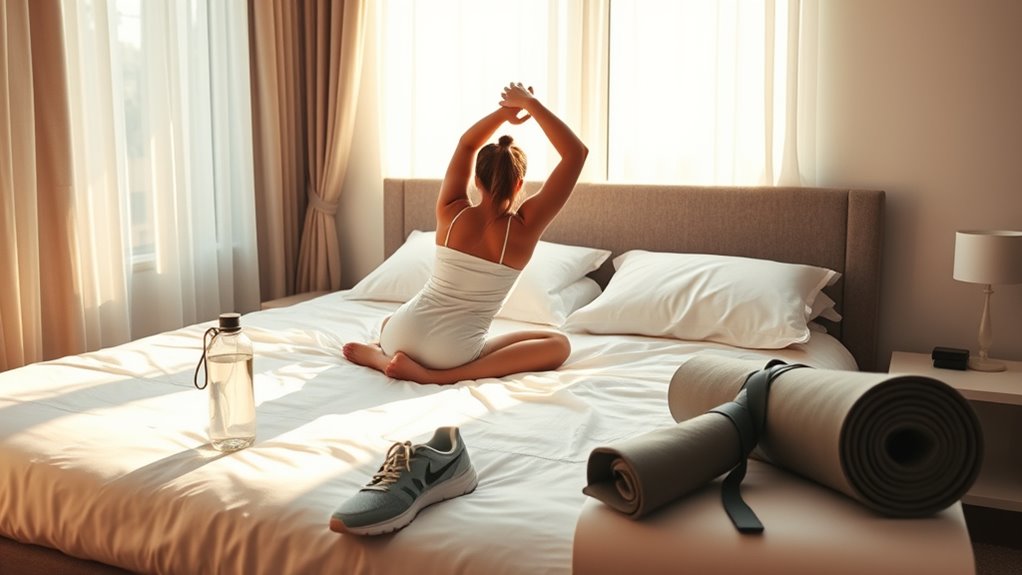
Getting regular physical activity can improve your sleep quality, but timing matters. Exercising too close to bedtime might make it harder to fall asleep, so try to finish workouts a few hours before bed. Staying active daily helps regulate your sleep patterns and keeps you feeling rested.
Exercise Timing Matters
Timing your exercise sessions can substantially influence your sleep quality, so it’s important to pay attention to when you work out. The timing exercises are performed can either boost or disrupt your sleep patterns. If you work out too close to bedtime, your body may stay alert, making it harder to fall asleep. To maximize your sleep, consider your workout scheduling carefully.
- Exercise earlier in the day if possible
- Avoid vigorous activity within 2-3 hours of bedtime
- Incorporate moderate workouts in the late afternoon
- Listen to your body’s cues for ideal timing
Stay Active Daily
Regular physical activity is essential for maintaining good sleep hygiene, as it helps regulate your body’s internal clock and reduces stress that can interfere with rest. Incorporate stretching into your routine to improve flexibility and relax your muscles before bed, making it easier to fall asleep. Staying active also boosts your mood and energy levels during the day, which supports better sleep at night. Remember the importance of hydration; drinking enough water helps prevent muscle cramps and dehydration that could disturb your sleep. Aim for consistent exercise, but avoid vigorous activity close to bedtime, as it may energize you instead of relaxing you. By staying active daily, you set the stage for more restful, higher-quality sleep.
Manage Stress Through Relaxation Techniques

When stress starts to build, practicing relaxation techniques can be an effective way to calm your mind and prepare for restful sleep. Techniques like mindfulness meditation and deep breathing help you shift focus away from worries and promote relaxation. To get started, try:
- Engaging in mindfulness meditation for a few minutes, focusing on your breath or surroundings.
- Practicing deep breathing exercises, inhaling slowly through your nose and exhaling through your mouth.
- Progressive muscle relaxation to release tension from your body.
- Listening to calming music or nature sounds to soothe your mind.
These methods lower cortisol levels and activate your parasympathetic nervous system. Incorporating them into your nightly routine can markedly reduce stress and improve sleep quality.
Avoid Heavy Meals Close to Bedtime

After practicing relaxation techniques to reduce stress, it’s important to pay attention to your evening eating habits. Heavy meals close to bedtime can cause digestive discomfort, making it harder to fall asleep and stay asleep. When you eat a large or rich dinner late in the evening, your body works overtime to digest, which can lead to feelings of bloating, acid reflux, or discomfort that disrupt your sleep cycle. To promote better rest, aim to finish eating at least two to three hours before bed. Opt for lighter, easily digestible snacks if you’re hungry closer to bedtime. By avoiding heavy meals late in the day, you support your digestive system and create a more conducive environment for restful sleep.
Limit Naps During the Day
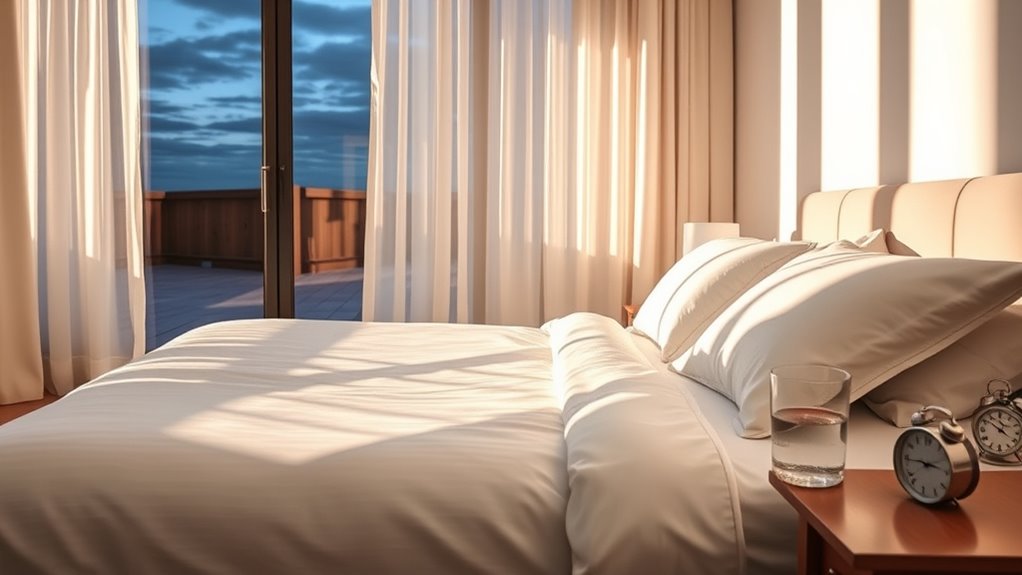
While short naps can help boost your energy, too many or lengthy daytime naps can interfere with your nighttime sleep. Power naps or brief daytime rest can be beneficial, but overdoing it may make falling asleep at night harder. To keep your sleep on track, consider these tips:
Short naps boost energy but too long or late naps can disrupt nighttime sleep.
- Limit naps to 20–30 minutes to prevent grogginess.
- Avoid napping late in the afternoon or evening.
- Use naps strategically, such as mid-morning or early afternoon.
- Recognize signs when you’re tired and avoid unnecessary daytime rest.
Seek Exposure to Natural Light During the Day
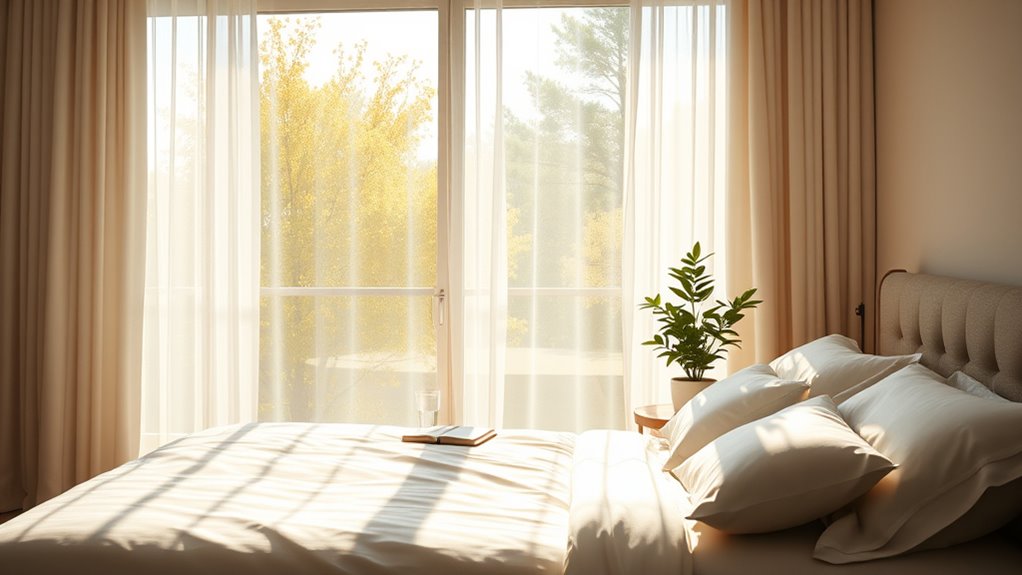
Getting plenty of natural light during the day can considerably improve your sleep quality at night. Sunlight exposure helps regulate your internal clock, making it easier to fall asleep and wake up refreshed. Aim for at least 30 minutes of daytime brightness, ideally in the morning, to reinforce your circadian rhythm. Spend time outdoors or near windows to maximize sunlight exposure.
| Tips for Natural Light Exposure | Benefits of Sunlight Exposure |
|---|---|
| Take morning walks | Boosts alertness and mood |
| Work near windows | Regulates sleep-wake cycle |
| Spend time outdoors | Enhances overall sleep quality |
| Avoid heavy curtains at daylight | Improves daytime brightness awareness |
Frequently Asked Questions
How Do Sleep Habits Vary Across Different Age Groups?
You might notice that sleep habits change with age due to developmental sleep patterns and adolescent habits. As a child, you likely need more sleep and follow a consistent bedtime routine. During adolescence, your sleep shifts later, and irregular habits may develop due to social or academic demands. As you grow older, sleep needs often decrease, and you might struggle with maintaining regular sleep schedules, impacting overall rest quality.
Can Sleep Hygiene Practices Reduce Specific Sleep Disorders?
Think of sleep hygiene as a key that can unlock better sleep, even for those with sleep disorders. By practicing good sleep hygiene education, you can reduce symptoms of sleep disorders like insomnia or sleep apnea. While it’s not a cure-all, improving habits like consistent sleep schedules and limiting screen time can support sleep disorder treatment, helping you rest more peacefully and wake up refreshed.
What Are Signs of Poor Sleep Hygiene?
You might notice signs of poor sleep hygiene if your sleep environment is noisy, bright, or uncomfortable, making it hard to fall asleep or stay asleep. An inconsistent sleep routine, such as irregular bedtimes or screen time before bed, can also cause frequent awakenings and daytime fatigue. These signs indicate your habits may be disrupting your rest, and improving your sleep environment and routine can help restore better sleep quality.
How Long Does It Take to See Improvements From Good Sleep Habits?
Think of your sleep journey like planting a garden; patience and consistency matter. Usually, you’ll notice improvements within one to two weeks if you stick to good sleep habits. Focus on maintaining consistent sleep duration and establishing a routine. Over time, your body adapts, and restful sleep becomes more natural. Keep at it, and you’ll see the benefits grow, much like a well-tended garden flourishing.
Are There Cultural Differences in Sleep Hygiene Recommendations?
You might notice that cultural norms and traditional remedies influence sleep hygiene recommendations differently across communities. Some cultures prioritize specific bedtime routines or herbal remedies, while others emphasize environmental factors. These differences can shape your approach to better rest. Recognizing and respecting these cultural variations can help you adopt sleep habits that feel more natural and effective within your cultural context, ultimately improving your sleep quality.
Conclusion
Think of your sleep habits as the gears of a finely tuned clock; when they work together smoothly, restful nights follow effortlessly. By sticking to consistent routines, creating a calming environment, and managing stress, you set the stage for better sleep. Small changes are like tiny cogs that turn, gradually aligning your nights with peaceful rest. Embrace these habits, and watch your sleep schedule run like clockwork, restoring your energy and well-being.
